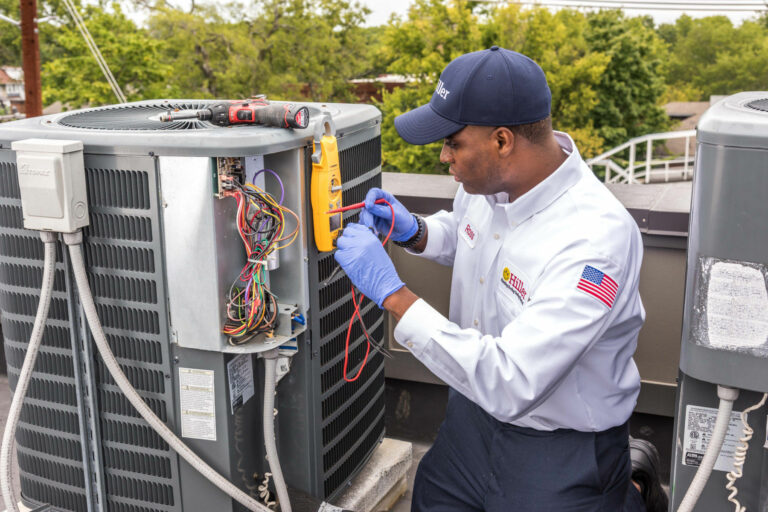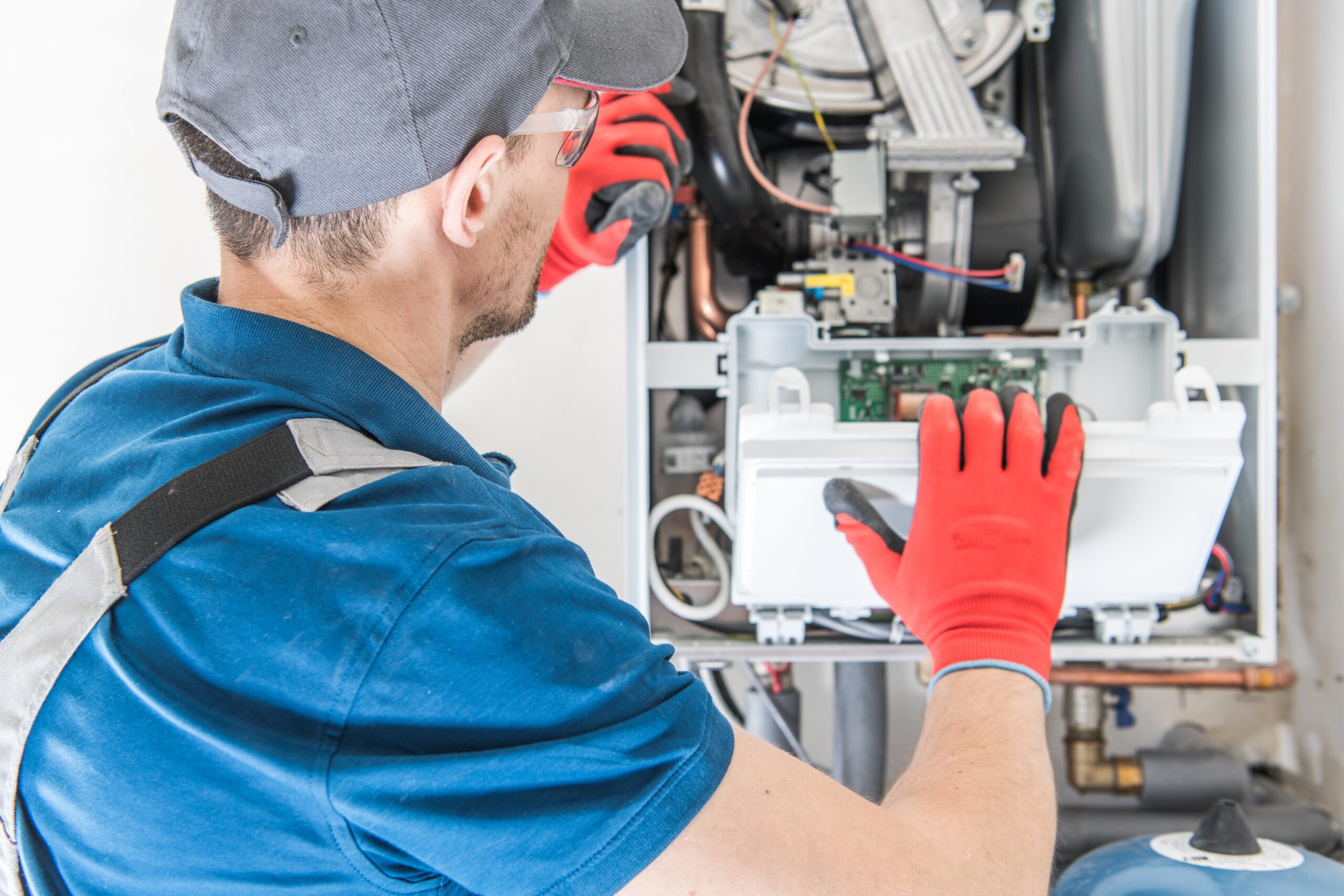Comparing Options for heat pump installation ooltewah tn
Comparing Options for heat pump installation ooltewah tn
Blog Article
Choosing In Between a Heatpump and Furnace: Secret Factors To Consider for Your Heating And Cooling Needs
When assessing heating alternatives for HVAC needs, the choice in between a warmth pump and a furnace can be complicated. Each system uses distinctive benefits customized to specific climates and energy efficiency goals. Recognizing these distinctions is vital for making an educated option. Secret aspects such as installation prices and ecological influence additionally complicate the choice process. Which alternative truly aligns with one's convenience and sustainability preferences? The following sections will explore these factors to consider carefully.
Comprehending Warm Pumps: How They Work and Their Advantages
While several property owners consider numerous home heating alternatives, understanding how heat pumps feature and their benefits can substantially affect their decision. Heat pumps run by moving heat instead than producing it. In the winter, they extract warmth from the outside air or ground and transfer it inside, while in the summertime, they reverse this process, cooling down the home by eliminating warm outside. This double capability makes them flexible for year-round environment control.One of the primary advantages of heatpump is their energy performance. They utilize substantially less power contrasted to traditional home heating systems, potentially leading to lower energy bills (heat pump replacement ooltewah tn). Furthermore, heatpump have a smaller sized carbon impact, making them an environmentally friendly choice. They likewise call for less maintenance than standard systems, contributing to long-lasting expense savings. On the whole, understanding the auto mechanics and benefits of heatpump can help homeowners make notified choices concerning their home heating and cooling down needs
Discovering Heating Systems: Kinds, Procedure, and Benefits
Heaters come in different kinds, consisting of gas, electric, and oil models, each with distinct operational mechanisms. Understanding these differences is necessary, as they influence performance and home heating efficiency. In addition, furnaces provide many advantages, such as constant warm result and integrity in cooler environments.
Sorts of Furnaces
Heating systems can vary significantly in design and operation, with heating systems being a prominent option among property owners. There are numerous kinds of heating systems, each using different gas resources and technologies. Gas heating systems prevail, leveraging gas to produce warmth efficiently. Electric furnaces, on the various other hand, utilize electrical resistance to create heat, usually favored for their straightforward installation. Oil heaters, while less common, work in areas with limited gas accessibility (heat pump replacement ooltewah tn). Furthermore, condensing heaters maximize energy effectiveness by catching and recycling exhaust gases. Each kind operates via a system of warm exchangers and ductwork to distribute cozy air throughout a home. Recognizing the distinctions between these furnace types is crucial for informed cooling and heating decisions
Advantages of Heaters
For home owners looking for reliable heat during cold months, the benefits of heaters are substantial. Furnaces give consistent heating, making certain even temperatures throughout the home. They are especially reliable in extreme cold, typically surpassing heatpump in cold problems. Numerous kinds, including gas, electrical, and oil heating systems, use flexibility to satisfy diverse requirements and preferences.Furnaces also have a tendency to have lower initial installment expenses compared to heatpump, making them an extra accessible choice for many. Their robust design adds to a longer life-span, with lots of systems lasting over 15 years with correct maintenance. Additionally, contemporary heating systems are typically outfitted with innovative technology for improved effectiveness, which can cause minimized power costs. In general, furnaces stay a trustworthy option for effective home heating.

Energy Performance: Comparing Warm Pumps and Furnaces
When contrasting power efficiency in between warm pumps and furnaces, the Seasonal Power Performance Proportion (SEER) plays a vital duty in determining performance. Furthermore, a functional expense evaluation exposes the long-lasting monetary ramifications of each system. Comprehending these variables can guide homeowners in making educated choices concerning their home heating remedies.
Seasonal Energy Effectiveness Ratio
Energy performance plays an essential role in the decision-making procedure in between warm pumps and heating systems, especially when considering the Seasonal Energy Efficiency Proportion (SEER) This metric measures the cooling effectiveness of heatpump over a whole air conditioning period, supplying a standard way to assess performance. Higher SEER ratings show higher energy effectiveness, converting to lower power intake and lowered utility bills. On the other hand, heaters are commonly assessed making use of the Annual Gas Application Efficiency (AFUE) score, which reflects home heating performance. When comparing these 2 systems, property owners should focus on SEER scores for heatpump, as they directly influence general power financial savings and ecological sustainability. A comprehensive understanding of SEER can especially influence the lasting fulfillment and cost-effectiveness of the picked heating and cooling remedy.
Operational Expense Evaluation
Understanding the operational prices related to heatpump and heaters is vital for house owners assessing their alternatives. Heatpump usually provide greater power efficiency, transforming electrical power into warmth with minimal waste. This leads to lower month-to-month utility expenses, particularly in modest environments. Conversely, conventional heating systems, specifically gas models, may have reduced ahead of time prices however can incur higher functional expenditures over time due to sustain prices and effectiveness ratings.Moreover, heatpump can work as both home heating and cooling down systems, possibly minimizing the demand for different heating and cooling systems. While preliminary investments for warmth pumps might be greater, their long-lasting financial savings in power effectiveness can make them a much more cost-effective selection for several households. Cautious analysis of local energy prices is necessary to figure out the very best option.
Setup Costs: What to Anticipate for Each Heating System
Installation expenses for home heating systems can differ considerably between warmth pumps and heating systems, affecting home owners' decisions. Heatpump typically have higher upfront installation costs, normally ranging from $3,500 to $8,000, depending on the unit size and complexity of installation. This consists of the outdoor unit, interior handling system, and required ductwork modifications. Alternatively, furnaces often tend to have lower initial expenses, balancing in between $2,500 and $6,000, which can be appealing for budget-conscious house owners. Installment expenses can increase if considerable ductwork is required.Moreover, the selection of fuel kind for heating systems-- all-natural gas, gas, or electric-- can also affect installation expenses. While heatpump use power performance, their initial investment might prevent some customers. Ultimately, reviewing installation expenses along with lasting financial savings and efficiency will help home owners in making educated decisions regarding their furnace.
Environment Factors To Consider: Which System Executes Much Better in Your Area
How do environment problems influence the performance of heater? The efficiency of warm pumps and heaters can differ substantially relying on the local climate. In moderate climates, heatpump excel by efficiently moving heat from the outdoors air, making them an energy-saving choice. Their performance lessens in very cold temperatures, where they might struggle to remove sufficient warm. Conversely, furnaces, specifically gas models, provide trusted and constant warm no matter exterior conditions, making them more suitable in cooler regions.In areas that experience milder winters months, heatpump can operate properly year-round, offering both cooling and heating. In contrast, areas with extreme winter seasons often gain from the robustness of furnaces. Eventually, understanding the regional environment is vital when deciding in between a heatpump and a furnace, as it straight influences their operational performance and overall performance.
Upkeep Needs: Long-Term Look After Warmth Pumps vs. Furnaces
While both warmth pumps and heating systems need normal maintenance to ensure peak performance, their certain requirements and care routines differ considerably. Heaters typically need much less regular interest, with annual inspections sufficing to inspect for gas leaks, tidy informative post filters, and evaluate general functionality. Their less complex style usually permits simple repairs.In comparison, heat pumps demand biannual maintenance as a result of their double role in heating & cooling. This includes cleansing coils, inspecting refrigerant degrees, and making sure that both the outside and interior devices work at their best. Furthermore, heatpump maintenance commonly includes more intricate elements, making expert maintenance essential.Neglecting upkeep can cause reduced efficiency and raised power prices for both systems. Eventually, home owners must consider these long-lasting care demands when picking in between a heat pump and a heating system, as aggressive maintenance can expand the life-span and efficiency of either system considerably.
Environmental Effect: Picking a Sustainable Heating Choice
The environmental effect of furnace is an essential examination for home owners seeking lasting alternatives. Warmth pumps are generally extra energy-efficient than typical furnaces, as they transfer heat as opposed to generate it, significantly reducing carbon emissions. By using sustainable power sources, such as geothermal or air-source heat pumps, property owners can even more decrease their environmental footprint.On the other hand, gas heating systems discharge greenhouse gases and contribute to air pollution, though they often supply higher heat outcome. Advancements in technology have actually led to the advancement of high-efficiency furnaces that minimize emissions.Ultimately, choosing a heating system involves weighing effectiveness against environmental influence. Property owners are encouraged to show on neighborhood power sources and rewards for renewable systems, ensuring an option that aligns with both individual comfort and ecological responsibility. The decision influences not only immediate comfort however additionally long-lasting sustainability and environmental wellness.
Often Asked Concerns
How Much Time Do Warm Pumps and Furnaces Normally Last?
The lifespan of warmth pumps normally varies from 15 to twenty years, while heaters can last in between 15 to 30 years. Routine upkeep significantly affects their durability and performance in offering home heating services.
Can I Utilize a Heat Pump in Very Cold Climates?
Warm pumps can run in very cold environments, yet their efficiency reduces as temperatures decrease. In such problems, supplemental home heating resources might be required to maintain comfortable interior temperatures and assure peak performance.

What Is the Noise Degree of Warm Pumps Versus Furnaces?
The noise levels of heatpump and heaters differ significantly. Generally, heatpump operate more quietly than conventional heating systems, making them more suitable for those delicate to seem, while heating systems my response may generate louder functional sounds throughout heating cycles.
Are Heat Pumps Suitable for Both Cooling And Heating?
Heat pumps are indeed ideal for both heating and air conditioning (ductless mini splits). They work by transferring warm, providing reliable temperature control year-round, making them a functional choice for property owners seeking an all-in-one HVAC remedy
What Size Heater Do I Required for My Home?
Figuring out the suitable size heating unit for a home calls for assessing elements such as square footage, insulation high quality, neighborhood environment, and the home's design. Consulting a specialist can guarantee a precise assessment and excellent comfort. Warm pumps normally provide greater power efficiency, transforming electrical energy right into warmth with very little waste. In modest environments, heat pumps succeed by efficiently moving warm from the outdoors air, making them an energy-saving alternative. On the other hand, furnaces, especially gas designs, provide regular and reliable warmth no matter of outdoor Click This Link conditions, making them preferable in cooler regions.In areas that experience milder winters, warm pumps can run properly year-round, providing both heating and air conditioning. Warm pumps are normally a lot more energy-efficient than typical heaters, as they move heat instead than produce it, considerably minimizing carbon exhausts. By utilizing renewable energy sources, such as geothermal or air-source warm pumps, house owners can additionally decrease their eco-friendly footprint.On the various other hand, all-natural gas furnaces give off greenhouse gases and contribute to air pollution, though they frequently give greater warmth outcome.
Report this page